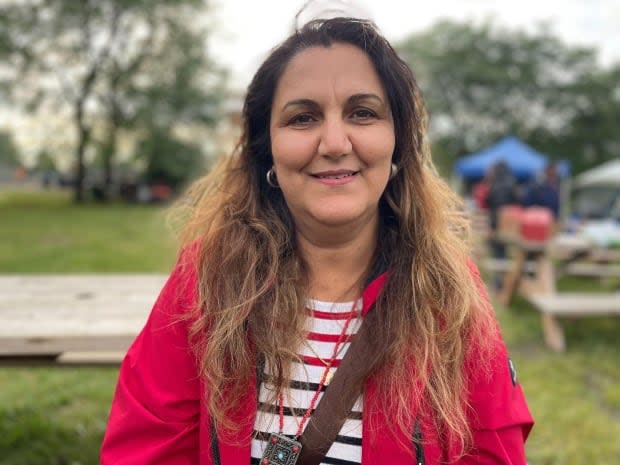Want to understand health inequities in a neighbourhood? Talk to the moms

It started out as a way to better understand vaccine hesitancy. But a community research project in Parc-Extension has grown into so much more.
Project ECHO was launched last fall in two Montreal neighbourhoods, recruiting community members, many of them parents, to find out why children and teens weren't getting their COVID-19 vaccine.
In Park Ex, four mothers from different backgrounds were hired and trained to conduct interviews. The moms then brainstormed how to support a family's decision-making around vaccination — but the conversations didn't stop there.
The researchers started hosting meetups for Park Ex moms that also had activities for children. The first was held on Mother's Day.
"A lot of issues came up," says Shamsun Naher Khanum, one of the mothers hired by Project ECHO.
They found that barriers to finding a gynecologist or pediatrician were common. But other topics, like isolation, housing, immigration and child care also often came up — issues that can also have health implications

"We realized the mothers needed so much more than just the vaccine," says Joyeuse Senga, a graduate student in public health at McGill University who is supporting the mothers conducting the research.
Just having the space for mothers to be vulnerable, to share their hardships and be there for one another is a way to combat some health inequities, she says.
It's something Taranjit Kaur, a mother of two living in Park Ex and a participant at the meetups, knows very well.
"I have too much depression before," she says.
Going outside and having a group of fellow moms with whom she could chat with, both at ECHO and through other organizations like Afrique au féminin helped, she says.
Project ECHO is now looking to invite experts, like someone from the neighbourhood's community health centre (CLSC), to help the mothers find resources and solutions to the barriers they're facing.
"It's really driven by the mothers and what they want. And so we try as much as possible to always have their feedback and then provide the resources and bring the experts based on their needs," said Senga.
Rahma Ghazouani, a mom of three, appreciates having a space for mothers to talk about these problems without having to arrange for child care.
"We must continue to do this, because we need it," she says.

Research driven by moms
In Park Ex, with its large allophone and immigrant populations, the researchers wanted to take an approach that involves the community at every part of the process — even if the scope becomes wider than initially thought.
"Whatever is top of mind for them is what we should focus on," says Niels Billou, the executive director of the Humanos Institute, who has been working with the ECHO team to design the project.
"We can't really talk about vaccine inequities without talking about access, for example, to pediatricians or about mental health," he says.
Letting the moms take the reins, he says, means they also are able to create solutions that take into account the specific needs of Park Ex, and are more socially accepted by people in the community.
Britt McKinnon, the researcher co-leading the project, says they plan to share its findings.
"We want that to be in a way that's helpful to community organizations, so they can learn from our results," she says.
"I can definitely see these projects being sustained."


